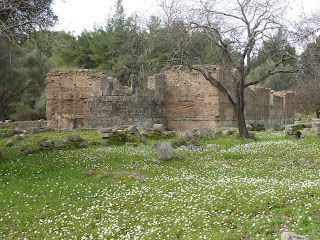We spent Sunday morning touring the archaeological site of the Olympic Games, Archaia Olympia. The first recorded Olympic Games occurred in 776 BC and ran an unbroken string every four years until 393 AD, when the Christians shut them down, along with various other pagan institutions. Initially, and for the first several hundred years, the Games provided a month-long truce every four years, allowing athletes and spectators to journey to sacred Olympia (birthplace of Zeus). The main occupation of the various Greek city-states, history tells us, was making war on each other and on anyone else within reach; so the Games were a nice respite. But then in Hellenistic times and later under Roman administration the Games changed, becoming less a Pan-Hellenic gathering than another spectacle. Sic transit, Gloria. Anyhow, the Games were forgotten, the site silted up under 3-4 meters of mud, and it was not re-discovered until the 18th century. Most of the archaeological work was done in the 19th century.
 |
Kronos Hill, a pathetic little near-hillock where Zeus was said to have been born (Kronos his dad; it's a long disgusting story), overlooks the Olympic sanctuary |
 |
In the sanctuary, entering the gymnasium area, where the athletes trained |
 |
The Phillipeon, a monument to Philip of Macedon, erected by himself, celebrating his conquest of Greece |
 |
Temple of Hera |
 |
Alongside the Temple of Zeus; 6th century earthquakes toppled pretty much everything sizeable |
 |
Pedestal of the statue of Nike (victory); we'll see her in the Museum |
 |
Temple of Zeus remains |
 |
The Temple of Zeus housed Pheidias' colossal statue of Zeus, one of the Seven Wonders; it was later carted off to Byzantium and there lost in a blaze; this representation, which I like, was in a bar in Olympia...Sic transit, etc. |
 |
Remains of vaulted entry to Olympic Stadium |
 |
OK, so the Greeks did know how to build an arch |
 |
Starting line in Olympic Stadium; intact, seriously, after all these years; I'll spare you the photo of me, this time only, lined up and awaiting the starting gun |
 |
Olympic Stadium, with Kronos Hill in the background; no seats, no skyboxes, nothing |


















































